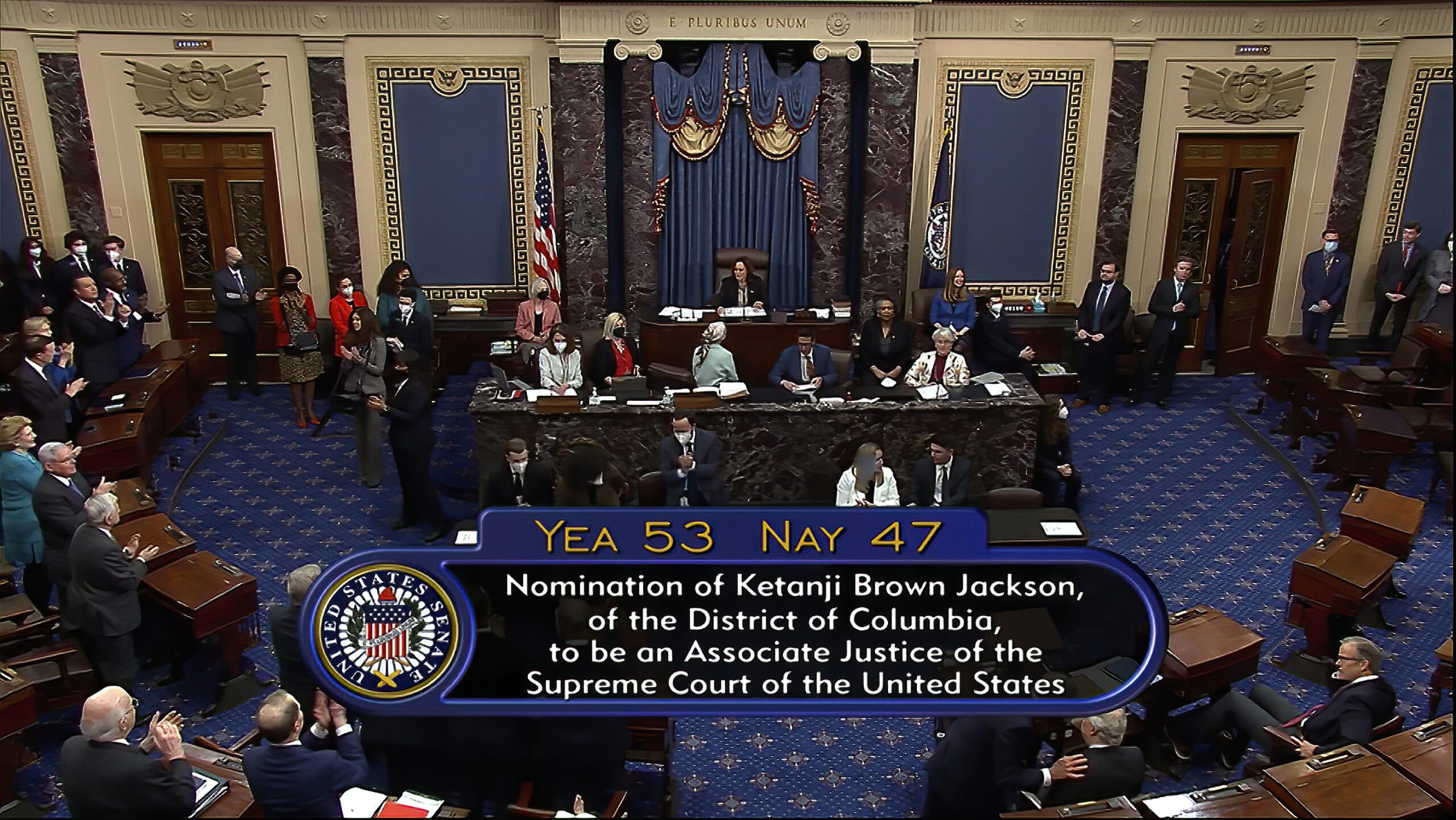Jackson approved as first Black female Supreme Court justice
[anvplayer video=”5101057″ station=”998122″]
UPDATE: The Senate confirmed Ketanji Brown Jackson to the Supreme Court on Thursday, shattering a historic barrier by securing her place as the first Black female justice and giving President Joe Biden a bipartisan endorsement for his effort to diversify the court.
Jackson, a 51-year-old appeals court judge with nine years of experience on the federal bench, was confirmed 53-47, mostly along party lines but with three Republican votes. Presiding was Vice President Kamala Harris, also the first Black woman to reach that high office.
Jackson will take her seat when Justice Stephen Breyer retires this summer, solidifying the liberal wing of the 6-3 conservative-dominated court. She joined Biden at the White House to watch the vote, embracing as it came in.

During the four days of Senate hearings last month, Jackson spoke of her parents’ struggles through racial segregation and said her “path was clearer” than theirs as a Black American after the enactment of civil rights laws. She attended Harvard University, served as a public defender, worked at a private law firm and was appointed as a member of the U.S. Sentencing Commission.
She told senators she would apply the law “without fear or favor,” and pushed back on Republican attempts to portray her as too lenient on criminals she had sentenced.
Jackson will be just the third Black justice, after Thurgood Marshall and Clarence Thomas, and the sixth woman. She will join three other women, Sonia Sotomayor, Elena Kagan Amy Coney Barrett – meaning that four of the nine justices will be women for the first time in history.

In this image from video from Senate Television, the final vote count of 53-47 is displayed after the U.S. Senate voted to confirm Ketanji Brown Jackson to the Supreme Court at the U.S. Capitol, Thursday, April 7, 2022, in Washington. (Senate Television via AP)
Her eventual elevation to the court will be a respite for Democrats who fought three bruising battles over former President Donald Trump’s nominees and watched Republicans cement a conservative majority in the final days of Trump’s term with the confirmation of Coney Barrett. While Jackson won’t change the balance, she will secure a legacy on the court for Biden and fulfill his 2020 campaign pledge to nominate the first Black female justice.
Senate Majority Leader Chuck Schumer said ahead of the vote that Jackson’s confirmation would be a “joyous day — joyous for the Senate, joyous for the Supreme Court, joyous for America.”
Despite the efforts to tarnish her record, Jackson eventually won three GOP votes. The final tally was far from the overwhelming bipartisan confirmations for Breyer and other justices in decades past, but it was still a significant bipartisan accomplishment for Biden in the 50-50 split Senate after GOP senators aggressively worked to paint Jackson as too liberal and soft on crime.
Statements from Sens. Susan Collins of Maine, Lisa Murkowski of Alaska and Mitt Romney of Utah all said the same thing — they might not always agree with Jackson, but they found her to be enormously well qualified for the job. Collins and Murkowski both decried increasingly partisan confirmation fights, which only worsened during the battles over Trump’s three picks. Collins said the process was “broken” and Murkowski called it “corrosive” and “more detached from reality by the year.”
Biden, a veteran of a more bipartisan Senate, said from the day of Breyer’s retirement announcement in January that he wanted support from both parties for his history-making nominee, and he invited Republicans to the White House as he made his decision. It was an attempted reset from Trump’s presidency, when Democrats vociferously opposed the three nominees, and from the end of President Barack Obama’s, when Republicans blocked nominee Merrick Garland from getting a vote.
Once sworn in, Jackson will be the second-youngest member of the court after Barrett, 50. She will join a court on which no one is yet 75, the first time that has happened in nearly 30 years.
View a Senate record of all votes on Supreme Court nominees here.
Jackson’s first term will be marked by cases involving race, both in college admissions and voting rights. She has pledged to sit out the court’s consideration of Harvard’s admissions program since she is a member of its board of overseers. But the court could split off a second case involving a challenge to the University of North Carolina’s admissions process, which might allow her to weigh in on the issue.
Republicans spent the confirmation hearings strongly questioning her sentencing record, including the sentences she handed down in child pornography cases, which they argued were too light. Jackson declared that “nothing could be further from the truth” and explained her reasoning in detail. Democrats said she was in line with other judges in her decisions.
The GOP questioning in the Judiciary Committee showed the views of many Republicans, though, including Senate Majority Leader Mitch McConnell, who said in a floor speech Wednesday that Jackson “never got tough once in this area.”
Democrats criticized the Republicans’ questioning.
“You could try and create a straw man here, but it does not hold,” said New Jersey Sen. Cory Booker at the committee’s vote earlier this week. The panel deadlocked on the nomination 11-11, but the Senate voted to discharge it from committee and moved ahead with her confirmation.
In an impassioned moment during the hearings last month, Booker, who is Black, told Jackson that he felt emotional watching her testify. He said he saw “my ancestors and yours” in her image.
“But don’t worry, my sister,” Booker said. “Don’t worry. God has got you. And how do I know that? Because you’re here, and I know what it’s taken for you to sit in that seat.”
INITIAL REPORT: The Senate is expected to confirm Supreme Court nominee Ketanji Brown Jackson on Thursday, securing her place as the first Black woman on the high court and giving President Joe Biden a bipartisan endorsement for his historic pick.
Three Republican senators have said they will support Jackson, who would replace Justice Stephen Breyer when he retires this summer. While the vote will be far from the overwhelming bipartisan confirmations for Breyer and other justices in decades past, it will still be a significant bipartisan accomplishment for Biden in the narrow 50-50 Senate after GOP senators aggressively worked to paint Jackson as too liberal and soft on crime.
“It will be a joyous day,” said Senate Majority Leader Chuck Schumer as he announced Thursday’s vote late Wednesday evening. “Joyous for the Senate, joyous for the Supreme Court, joyous for America.”
Jackson, a 51 year-old federal appeals court judge, would be just the third Black justice, after Thurgood Marshall and Clarence Thomas, and the sixth woman. She would join two other women, Sonia Sotomayor and Elena Kagan, on the liberal side of a 6-3 conservative court. With Justice Amy Coney Barrett sitting at the other end of the bench, four of the nine justices would be women for the first time in history.
After a bruising hearing in which Republicans on the Senate Judiciary Committee aggressively interrogated Jackson on her sentencing record, three GOP senators came out and said they would support her. The statements from Maine Sen. Susan Collins, Alaska Sen. Lisa Murkowski and Utah Sen. Mitt Romney all said the same thing — they might not always agree with Jackson, but they found her to be enormously well qualified for the job.
Collins and Murkowski both decried the increasingly partisan confirmation process, which Collins called “broken” and Murkowski called “corrosive” and “more detached from reality by the year.”
Biden, a veteran of a more bipartisan Senate, said from the beginning that he wanted support from both parties for his history-making nominee, and he invited Republicans to the White House as he made his decision. It was an attempted reset from three brutal Supreme Court battles during President Donald Trump’s presidency, when Democrats vociferously opposed the nominees, and from the end of President Barack Obama’s, when Republicans blocked Supreme Court nominee Merrick Garland from getting a vote.
Before the Senate Judiciary Committee last month, Jackson said her life was shaped by her parents’ experiences with racial segregation and civil rights laws that were enacted a decade before she was born.
With her parents and family sitting behind her, she told the panel that her “path was clearer” than theirs as a Black American. Jackson attended Harvard University, served as a public defender, worked at a private law firm and was appointed as a member of the U.S. Sentencing Commission in addition to her nine years on the federal bench.
“I have been a judge for nearly a decade now, and I take that responsibility and my duty to be independent very seriously,” Jackson said. “I decide cases from a neutral posture. I evaluate the facts, and I interpret and apply the law to the facts of the case before me, without fear or favor, consistent with my judicial oath.”
Once sworn in, Jackson would be the second youngest member of the court after Barrett, 50. She would join a court on which no one is yet 75, the first time that has happened in nearly 30 years.
Jackson’s first term will be marked by cases involving race, both in college admissions and voting rights. She has pledged to sit out the court’s consideration of Harvard’s admissions program since she is a member of its board of overseers. But the court could split off a second case involving a challenge to the University of North Carolina’s admissions process, which might allow her to weigh in on the issue.
Republicans spent the hearings interrogating her sentencing record on the federal bench, including the sentences she handed down in child pornography cases, which they argued were too light. Jackson pushed back on the GOP narrative, declaring that “nothing could be further from the truth” and explaining her reasoning in detail. Democrats said she was in line with other judges in her decisions.
The GOP questioning in the Judiciary committee stuck for many Republicans, though, including Senate Majority Leader Mitch McConnell, who said in a floor speech Wednesday that Jackson “never got tough once in this area.”
Democrats criticized the Republicans’ questioning.
“You could try and create a straw man here, but it does not hold,” said New Jersey Sen. Cory Booker at the committee’s vote earlier this week. The panel deadlocked on the nomination 11-11, but the Senate voted to discharge it from committee and moved ahead with her confirmation.
In an impassioned moment during the hearings last month, Booker, who is also Black, told Jackson that he felt emotional watching her testify. He said he saw “my ancestors and yours” in her image.
“But don’t worry, my sister,” Booker said. “Don’t worry. God has got you. And how do I know that? Because you’re here, and I know what it’s taken for you to sit in that seat.”